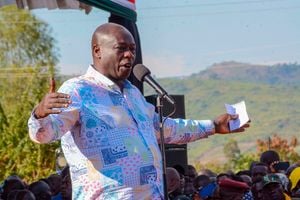How college changed fortunes of rural Tharaka village
The main entrance of Tharaka University College.
Six years ago, the semi-arid Gatunga area in Tharaka Nithi County was just another sleepy rural village.
The resilient indigenous shrub-browsing African cows and goats roaming freely on the vast lands were the only sources of livelihood for residents.
The little rain that occasionally falls in the region only supported fast-maturing crops like millet, sorghum and green grams, explaining why residents mainly kept indigenous livestock, which they sold to merchants from Meru County for meat.
But now Gatunga is a blossoming business hub.
Estates are coming up, tarmac roads are being laid, homesteads now have running water and hotels and recreational facilities are busy with activity.
An acre of land that sold for Sh30,000 six years ago now goes for Sh4 million, thanks to the establishment of Tharaka University College, a constituent college of Chuka University.
The once-neglected area is now the pride of Tharaka constituency, with investors from across the country fighting to buy a piece of land.
Residents can now travel from Gatunga market directly to Nairobi using public service vehicles on any day, unlike before when they had to travel to Meru town to catch a vehicle to the city, making it a two-day journey.
All hostels and rental houses in Gatunga are fully occupied by students, lecturers and the support staff, said Tharaka University College’s principal, Prof Peter Muriungi, meaning students must be transported by bus daily to nearby Marimanti town.
Tharaka University College’s growing population has changed the fortunes of residents, he said.
Some of the newly constructed rental houses near Tharaka University College.
September intake
The institution was established in 2016 as a campus of Chuka University with only 50 students. The following year, the population increased to 150. It has 2,500 students now, with 4,000 more expected in the September intake.
“This institution is an economic game-changer for not only Gatunga residents but also the entire Tharaka constituency and Tharaka Nithi County,” said Prof Muriungi.
He added that the college should get credit for infrastructure developments such as roads, piped water and electricity.
Students from nearby villages can walk to school, avoiding transport and accommodation expenses.
Prof Muriungi, however, said the government needs to hasten the tarmacking of the Chiakariga-Gatunga road and extend the tarmac from Meru County that ends at Miomponi.
“Although transportation has improved tremendously since the establishment of the college, the government should ensure the two roads connecting it to the rest of the country are completed,” he said.
He pointed out that although the college and surrounding villages are connected to electricity, the supply is not reliable, meaning the campus relies on back-up generators.
He also underscored the need for the county government to improve water supply in the region that is witnessing a population explosion and set up sewerage systems and proper town planning.
Joachim Njagi, a resident and real estate investor in the area, said the college has changed the lives of many people in the area and the future seems brighter.
The real estate business is booming and more houses are needed to meet the increasing demand.
Promotion of the college
On average, a single room rents for Sh3,000 a month, a bed-sitter for Sh4,000, a one-bedroom apartment for Sh6,000 and a two-bedroom for Sh9,000.
“More real estate investors are needed to meet the high demand because the promotion of the college to a university will mean many more students will come,” Mr Njagi predicted.
He urged residents to avoid exaggerating land prices, noting that a 50m-by-100m parcel next to the college is selling for Sh1 million.
Mucee Rukunja, another investor who focuses on hospitality, said the college has opened up many business opportunities and has the potential to grow further.
He expressed the need for a more reliable supply of electricity in the area to avoid frequent blackouts.
“The only small transformer that was installed in the area when the population was small has been overwhelmed,” Dr Rukunja said.
President Uhuru Kenyatta gave the nod to establish the college following a petition by the Ameru Professionals Association and Ameru Njuri Ncheke Council of Elders during a visit to State House in Nairobi.
President Kenyatta, on a campaign tour of the county in 2017, announced its upgrading to a university college and promised to make it a full-fledged university before his tenure ends in 2022.
The college management and residents are hopeful that the upgrading of the college will bring them more opportunities.





